14. The Empire Theatre of Varieties, Belfast

Shortly after putting the Star of Erin in Dublin back on its feet in 1892, Adam turned his attention to the rapidly growing city of Belfast, and made an investment there that was to remain in the family until 1961.
Belfast was the great Irish growth story of the 19th century. Driven by linen, shipbuilding and engineering, it had been half the size of Dublin in 1861 when George Wallace built a small hall on the site which he called ‘The Imperial Colosseum’. By 1879, the population of Belfast had soared to 200,000, and the management of this enterprise was taken over by Lindon Travers, who made the most strenuous efforts to raise the status of the hall. These efforts resulted in the name of the hall being changed, first to ‘Travers Musical Lounge’ then to ‘The New Colosseum, the Select Musical Lounge’. But it was apparent that it was not the name that was at fault, but rather the size of the building. Travers gave up the unequal struggle, and in 1879 the building was remodelled and opened as ‘The Buffalo’. It enjoyed mixed success before a radical new plan, entailing a new ownership structure led by Adam, and the complete rebuilding of the theatre was embarked on.
By the 1890s the population of Belfast was as great if not greater than that of Dublin. In 1894 Adam established a new company, the Belfast Empire Theatre of Varieties Ltd, for the purpose of acquiring, as a going concern, the ‘Belfast Empire’, a theatre in construction, and conducting it as a variety theatre in concert with the well-known and highly successful Star Theatre of Varieties, Dublin. This required resources beyond the pockets of the then proprietors, and it was Adam and his associates in Dublin who arranged a public flotation. The Northern Bank and the Royal Bank sought public subscription for 25,000 ordinary shares of £1 each [€130] and 500 five per cent debentures of £10 each. For the theatre as a going concern the company paid £20,700 in cash [€2.62m] and £8,300 in shares. The balance of £1,000 [€130,000] was to be available as working capital. The vendors were Daniel Lowrey and the architect James J. Farrall, who, as we have seen, was a director and the architect of the old Star of Erin.
Adam was appointed chairman, and he was doubtless the largest shareholder. Daniel Lowrey Junior (No. 3) became managing director of the company for a period of five years at a yearly salary of £300 but should the shareholders not receive a dividend at the rate of 10 per cent per annum, he agreed that he would accept only half of this amount for his services. By comparison with the Dublin theatre, which made a net profit of £3,296 in 1893 [over €400,000], the Empire Belfast in 1894/95 was forecast to make £5,724 [€710,000] exclusive of directors’ fees, management expenses and depreciation.
FINDLATERS
However, there was to be considerable trouble ahead before such profits could be attained. The Empire opened its doors for the first time on Monday 3 December 1894 and as the packed house waited for the first item on a star-studded bill, they expressed great admiration for the finish, comfort and general appointment of the whole theatre. Outside, an even vaster crowd had assembled, at first with high hopes of securing a vacant seat for the performance, and afterwards as these hopes dwindled, of seeing the apparently endless procession of theatregoers, and watching while the hansoms and stately carriages deposited their occupants at the doors of this new palace of entertainment.
A special excursion train, first class only, with three hundred invited guests, was run from Dublin for the occasion and the opening show received rave reviews from all the publications of the day in Belfast and Dublin. The Northern Whig reported: ‘A brilliant opening was the unanimous verdict of the overflowing crowd’, while the Belfast Evening Telegraph described the house itself as ‘a marvel of Moorish magnificence’. The Irish Times compared the decoration of the theatre with that of ‘The Palace in London’, and approvingly noted that the opening performance was ‘a brilliant success, every part of the beautiful building being crowded by a fashionable assemblage’.
But it quickly became apparent that there was a serious problem with the new theatre. Unbelievably, the stage could not be seen from many parts of the house because of the old-fashioned arrangement of the galleries in straight lines. As the Belfast Evening Telegraph facetiously observed:
Now it may be prejudice, but it is nevertheless a fact that when people go to a place of entertainment they seem to think they have a right to see the performance. And having paid (as he argues) to see a dance or a tumble, it is not surprising that the Belfast ‘young man’ should insist on value, and refuse to be put off with a glimpse of an angel in stucco or of a section of decorations in cream and gold. Therefore it was that the ‘old-new’ Empire fell into disrepute. People did not care to go to a place where they had no certainty of witnessing the performance, preferring less elegant houses where, however, they could reckon on getting reasonable value for their shillings and sixpences.
Owing to the peculiar arrangement of the boxes, the view of the stage was obtained through a species of lane. The result was that the wings of the circular portion of the house—notably of the balcony and gallery—were cut off from a view of the stage. It was not so bad in the pit, but if standing were allowed at the sides (where under the circumstances many persons might have witnessed the performance with perfect satisfaction), an enormous number of seats would have been deprived of a view of the stage. But perhaps the worst defect of all was in the balcony (one of the best parts of the house), where the back portion was wasted, through the floor of the gallery coming down below the level of sight.1
Adam had been landed with a problem of enormous proportions. He had raised capital for a sound business venture promoted by men with a proven track record—Lowrey in the theatre, Farrall as an architect, Stokes Bros and Pim as
THE EMPIRE THEATRE OF VARIETIES, BELFAST
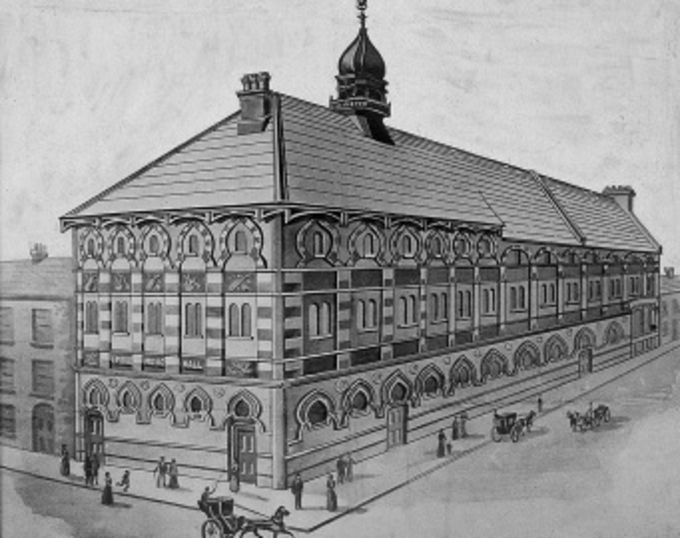
The Empire Theatre of Varieties, Victoria Square, Belfast
financial advisers (they were auditors to one-third of the Dublin stock exchange companies) and Battersbys as valuers. A lesser man would have thrown his hat at the problem and walked away. Adam called in a London specialist in theatre architecture, and they advised that there was no alternative but to pull the theatre down and rebuild. The Belfast Evening Telegraph of 26 October 1895 continued the story:
Mr Lowrey naively confesses that he ‘never could understand plans’, but he knows a house when he gets it. Alarmed and chagrined at the results, which he witnessed, he determined to exercise the powers of his position as co-vendor of the property and Managing Director of the company to have things put right. With this object, he laid his doubts and determination before Mr Adam Findlater, the chairman of the company, with whom he had been associated for years in connection with the Star Theatre of Varieties, Dublin. From this gentleman he received hearty support, and between them they resolved Mr Lowrey to be no party to selling, and Mr Findlater to be no party to buying a house which did not give absolute satisfaction to the public. What proved to be a fatal omission in regard to the building of the old house was now remedied—viz. the services of Theatrical Architects in London were employed. Mr C. J. Phipps, F.R.I.B.A., and Mr T. H. Watson, F.R.I.B.A., both reported that no adequate improvement could be obtained without dismantling. There was nothing left, therefore, if the requirements of the public were to be adequately supplied, but to make a clean sweep of the dainty, but defective, theatre which charmed us for a few brief weeks at the close of last year. After a careful consideration of suggestions and plans, Messrs Lowrey and
FINDLATERS
Findlater resolved to adopt this courageous course; and it is due to the firmness of these two gentlemen that the company now possesses a building which skilled opinion declares to be relatively perfect without the expenditure of an extra penny of the shareholders’ money. It is certainly hard on Mr Lowrey that he should, under the circumstances such as these, lose his justly-earned profit on an enterprise which was essentially his own, but he has submitted to his fate with customary courage and good humour, feeling only too glad that he has been able to protect the interests of the public who have stood by him for so many years. We trust he will be recompensed by a long run of success, and that, when big dividends arrive, his self-sacrifice will not be forgotten by grateful shareholders.
The new building has been carried out from plans prepared by Mr R. Henry Brunton, M.Inst, C.E., F.R.G.S., of London, which were submitted to, and approved by Mr T. Watson, F.R.I.B.A., also of London. Mr Brunton is a gentleman who has for many years been connected with the construction of theatres and music halls, and has also carried out large structural works in different parts of the world. In designing the new house Mr Brunton had two requisites to keep steadily in view—to afford the audience a full view of the stage, and second, to provide accommodation for larger audiences.
The company needed and had a strong and resourceful chairman to see them through this extremely difficult episode. By March 1895 litigation had been instigated against James Farrall, the architect who was a board member and one of the vendors to Adam’s Empire Theatre company. In September the leading architect, Henry Brunton, indicated that the theatre would be ready by 21 October. Six days later, on 26 October the Empire re-opened. As the Belfast Telegraph put it: ‘It is the merest figure of speech to describe the “function” fixed for Monday evening in Victoria Square as a “reopening”. The theatre we were invited to view last evening is literally an entirely new building, bearing little or no resemblance to the structure, which rose up rapidly some twelve months ago, and as rapidly disappeared.’
The legal ramifications took longer to work out. On 4 November 1895 Battersbys received a letter from the company’s solicitors (William Findlater and Co., of course) seeking ‘an explanation of the statements which were in their valuation dated 27 November 1894’. Apparently Battersbys had approved a valuation claiming that the theatre was capable of accommodating about 2,000 persons; whereas, in truth, it could not accommodate more than 1,100. There were also false and fraudulent representations that the theatre was adequately designed and constructed, whereas there were grave and radical defects in its design and construction. And that the floors, staircases, vestibules and bars were fireproofed, whereas they were not. The document also stated that Daniel Lowrey (presumably junior, the manager in Belfast), ‘has throughout admitted that, though personally innocent in the matter, he is liable for the frauds, acts and defaults of the plaintiff, his co-vendor’.2
January 1896 seemed to presage a year of even more trouble. It started with a
THE EMPIRE THEATRE OF VARIETIES, BELFAST
fire in the newly restored theatre that destroyed the engine room and dressing rooms. Adam was in Dublin at this time and had to communicate with his board by telephone. It was decided that Henry Brunton should be again instructed on the re-building. In the meanwhile, Dan Lowrey devoted the proceeds of the matinée for the benefit of those artists who had lost their wardrobe by the fire. A total of £60 was raised [€8,000].
In March the balance of account due to Henry Brunton was submitted. Despite a letter written by Dan Lowrey that he was ‘thoroughly satisfied that the excessive re-modelling effected will prove most profitable to the company’, the company were less than satisfied with the amount charged by Brunton. Lowrey accepted responsibility for the delay, and offered to let the new company deduct from the moneys owed to him sufficient to pay a 5 per cent dividend to the shareholders. Even this did not satisfy the board and on 24 March 1896 the secretary was instructed to write to Henry Brunton stating that the board considered the fees charged excessive, especially in relation to the rebuilding of the dressing rooms. They later queried his per diem charge of £5 5s [€691] which he was receiving in addition to a commission of 7½ per cent on the building cost.
Lowrey’s letter, accepting financial responsibility for the closing of the theatre, may seem odd to the modern businessman. However, the minute books of the Star Theatre show that this practice was not an unusual one. For example, in 1916, the directors of the theatre are recorded as having unanimously agreed to renounce their claims to ‘any fees and remuneration’ to which they were entitled. 3 And the exact same decision was made in 1931 when it was recorded that: ‘No provision having been made in the accounts in respect of Directors’ Fees and remuneration it was unanimously decided by those present to waive any claim for remuneration for that year.’4 Indeed, a year previously, when it was impressed on the manager of the Star the necessity for cutting down expenditure, he ‘expressed his willingness to cut his own salary by 30s per week, and undertook to curtail expenditure under all headings.’5 Not only managers were financially liable—a note from the minute book of 1912 confirms that artists were also expected to pay a non-performance fee: ‘Under the terms of release Mr George Formby would pay to the company an equivalent sum to that which he would have received for salary in respect of each date he would have to perform.’
Farewell benefit for Dan Lowrey the third
In July 1895 Farrall resigned, having been formally asked to by Lowrey, and on 29 October 1895 Thomas Richie resigned and was indemnified from the various actions pending. Then in February 1896 formal notice was served on Messrs Farrall, Lowrey, Richie and Twamley regarding forfeiting shares on which calls had not been paid up. And in March Charles Reynolds, the last of the original non-executive directors, resigned his seat on the board.
1897 saw the departure of Dan Lowrey the third from the theatre. It was not a happy event. Lowrey had had to accept responsibility for the fiasco of the rebuilding of the Empire, Belfast, and must have resigned with bad memories of
FINDLATERS
his endeavours to improve the theatre. However, according to the Belfast Newsletter his farewell benefit was
a fitting tribute to that gentleman’s excellent services over a long period of time on behalf of the music-hall going section—a very considerable one—of the Belfast public . . . The name of Lowrey is inseparably identified with the Empire in Belfast, and Mr Lowrey’s departure is a distinct loss—a fact which was evident from the many expressions of regret last night that the occasion was one of a farewell nature. Not only with the public has Mr Lowrey been a favourite, but among the members of the profession he is held in the highest esteem, as a token of which it is only necessary to point to the lengthy and excellent programme that was last night presented to an overflow house. During an interval Mr Lowrey came forward and made a brief speech. His appearance was the signal for a loud and prolonged outburst of cheering. He said—Ladies and gentlemen, I am not going to try to make a great speech, because I have not the language at my command on the present occasion to do so. I can only convey in a few words that I thank you from the bottom of my heart for the great send-off you are giving me tonight (applause). It shows me that I have not been too bad in your estimation, and as long as I live I shall never forget it. I thank you once more heartily, and wish you good-bye’ (loud applause), following which the audience, rising, sang ‘For he’s a Jolly Good Fellow’.6
Director resident in Belfast
Three years later, in 1900, Adam invited Alfred Edwards on to the board of directors of the Empire. Edwards was the proprietor of Maguire and Edwards, furniture manufacturers and wholesalers who had supplied much of the furnishings to the Empire. He was a gentleman of undoubted integrity and business acumen and attended to all the business issues that arose on a daily basis in Belfast. The board meetings were held in Dublin and the minutes record their appreciation of ‘the excellent services rendered by Mr Edwards’ over a period of seventeen years. He died in 1921. Joseph Connolly, later a Senator, was a friend of Edwards, and recorded his attempts to keep the music hall respectable.
In the early nineteen-hundreds the music halls were at the peak of their popularity, but were still frowned on as being not quite respectable by a great many people who were by no means ultra-Puritanical or Calvinistic. There was considerable justification for their hostility for there was much on the stage and around the bars that was objectionable. Old Alfred [Edwards] and I often discussed this, and it is to his credit that he set his face against anything that would be unseemly. I remember him summing it up to me briefly when he said: ‘A lady doing her show at the Empire can come in, go to her room, go on and do her stuff, go back to her room, dress, turn the key in the door and go to her hotel or lodgings just as your typist in the office does.’ Maybe it did not all work out so smoothly as that, but that was how Alfred wanted it and how the manager was directed to run the house. Similarly on the stage it was his policy to have anything objectionable cut out.7
However, as Louis Gilbert wrote in 1961, not everyone believed in his policy:
THE EMPIRE THEATRE OF VARIETIES, BELFAST
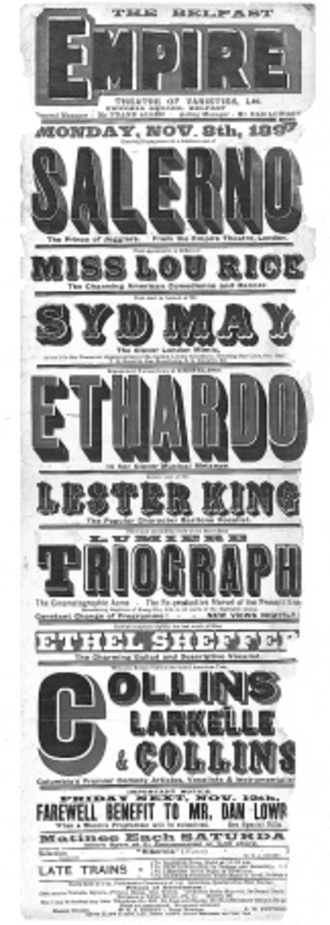
1897 Empire Theatre bill
Many people will regard the passing of the Empire as a calamity, but I remember a time when it was not held in such high esteem by the citizens of Belfast. Thirty years ago, my Aunt Louisa—who regarded herself as respectable, broadminded and artistic—considered it a den of iniquity. Yet she was a woman who liked the theatre.
She went to the Opera House regularly and had no objection to queuing for an hour or more at the pit early door. And there were occasions when she would go to the first house of the Hippodrome when Sir Harry Lauder, Will Fyffe or Dorothy Ward topped the bill. But the Empire–it was completely out of the question!
When I was at school she always took me to Fred Warden’s pantomime in the Opera House as a Christmas treat, but once when I suggested that she might take me to the Empire instead she was horrified.
She was so shocked at my suggestion that she told my parents and the Rector about it. The Rector was very grave and concerned and he spoke to me seriously. I was to keep away from the Empire on the peril of my life. It was no place for me. I would imperil my future watching sparsely- clad dancers, hearing bold women singing questionable songs and listening to broken down humourists telling jokes of bad taste.
The Rector’s words impressed me so much that I kept away from the Empire for a number of years. I visited it in the early thirties for the first time when I was 16. The Will H. Glaze Stock Company was playing a summer season there and the prices of admission were reduced. Stalls 2s. and 1s 6d., Circle 1s. and Gallery 6d.
The play that aroused my curiosity was described as an emotional drama called ‘The Sins of the Rich.’ The advertisements stated that it was ‘For adults only’ and that ‘No person under 16 would be admitted’.
I could always afford 1s on a Saturday night, so I loitered in front of the theatre long enough to ensure that there was nobody in Victoria Square who would recognise me, then I darted quickly to the circle entrance.
FINDLATERS
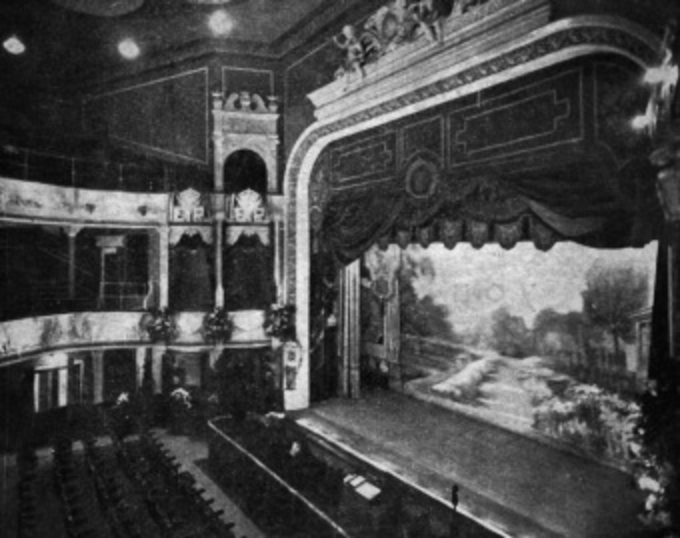
The interior of the Belfast Empire in the 1950s
The Empire was drab and a bit threadbare in those days. The paintwork was dark and heavy, the upholstery well worn, torn and musty—the air reeked of oranges and strong drink. The girl attendant wore a black dress with a maid’s white cap and apron.
The audience was small, but the thought of the theatre closing had not been conceived. While I waited for the play to start I listened to the seven-piece orchestra under the direction of a little bearded violinist, Mr J. C. Evans, rattling its way through the William Tell Overture.
I was not disappointed. I did not feel that my precious shilling had been spent foolishly because I was fascinated by the highly-strung story presented on the stage. I was seeing a play for the first time. I was watching human beings—not pictures!
Their actions gripped me as no film had ever done. I was one with the hero. I was almost moved to tears by the plight of the wronged working-class girl, and I sincerely expressed my hatred when I hissed the rich villain.
I do not know who wrote ‘The Sins of the Rich’, but as I watched this melodrama which must have been dated even in the early thirties—there was born in me a love of drama which has never faded, and on looking back it seems strange that such a thing should have happened in a music hall like the Belfast Empire
I went back to see other productions by the Will H. Glaze Stock Company—’A Royal Divorce’, ‘Temptation’, ‘Con the Shaughran’, ‘Murder in the Red Barn’. Each of these helped my appreciation of plays to grow.
I saw my first Ulster play in the Empire about this time too. The Limavady players presented George Sheil’s ‘Professor Tim.’ And after seeing this I realised for the first time that the life of my own people was material for stage and very entertaining.8
THE EMPIRE THEATRE OF VARIETIES, BELFAST
Undoubtedly, the Empire was a theatre that survived on tradition. The first show was topped by the ‘World-renowned London Star, Little Titch.’ Also in the programme was ‘La Belle Rose’ billed as the latest Parisian terpsichorean novelty, ‘The Great Karno Troupe’, ‘Minnie Parker the Dashing Soubrette’ and the ‘World-renowned White-eyed Kaffir Chirgwin.’
The two Empires, Dublin and Belfast, were linked up in what was known as the Moss- Thornton tour. The artists normally came to Belfast from Glasgow or Liverpool; they played for a week and then proceeded to Dublin for another week before resuming their tour of the English and Scottish cities and towns.
Tommy Davy, who worked backstage at the Empire from 1904 for more than fifty years, remembers his early days:
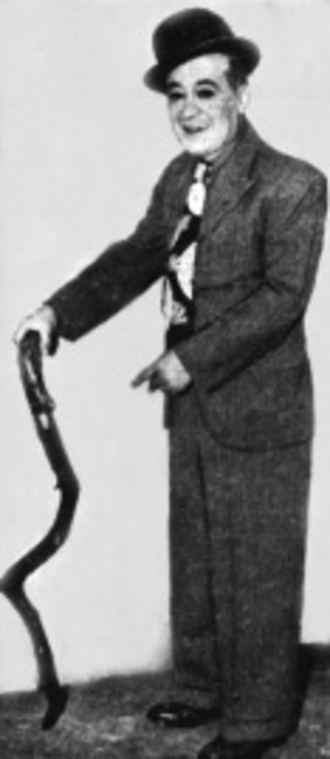
Dublin Comedian Jimmy O’Dea using Sir Harry Lauder’s famous walking stick for a show at the Empire (Belfast Telegraph)
In those days a big star would come here year after year singing the same songs, doing the same dance, going through the same patter; and the audience came because they knew what to expect and they loved it, no matter how often it was repeated. Each star then had his or her own songs and routines that no one else dared use. I remember seeing Charlie [Chaplin] in ‘Casey’s Court’—a sort of Cockney forerunner of the ‘Our Gang’ type of fun. But that was when I was a youngster and was able to sneak in when the manager wasn’t looking! In ‘The Mumming Birds’, Charlie played a toff seated in a box at the theatre. Hostilities opened when a boy produced a peashooter. Charlie was at the receiving end of a few custard pies, but emerged victorious, and walked off escorting a soubrette, who meanwhile had been doing her act in midstage. Charlie stayed in a house in Joy Street which was used regularly by theatrical people.9
In 1955 at the theatre’s diamond jubilee celebrations the thrill of the evening came when the chairman read a telegram from Charlie Chaplin sent from Switzerland: ‘My best wishes to the Friends of the Belfast Empire Theatre of Varieties on its Diamond Jubilee. May you enjoy long years of peace, prosperity and happiness.’
Other artists Davy remembers were Marie Lloyd, whom he describes as ‘the most friendly of all’. Then there was Harry Lauder, the Scottish comic singer and first artist of his kind to be knighted. He got £8 a week for doing the same Scottish song-and-patter, ‘Roamin’ in the Gloamin’’ that later brought him thousands. George Formby senior also played at the Empire. According to Davy, ‘he kept on appearing even when he was nearly dying, but he was too good an
FINDLATERS
artist to let the audience notice that there anything was wrong.’ The list contains all the great music-hall stars: Eugene Stratton, Marie Kendall, Marie Loftus, Vesta Tilley, Lillie Langtry, Chas Coburn—they all came to the Empire. And as the decades rolled on, new stars began to emerge. Bud Flanagan and Chas Allen started in the Empire in 1927 with a Florrie Ford revue. Initially they had separate parts in the revue, but backstage they decided to make a comedy team.
And then there was the RUC constable who, according to Davy, stepped straight off his beat outside the Empire; out of the blue he called in for an audition, mounted the stage, unhooked the collar of his uniform, and sang. No sooner had the notes of ‘The Holy City’ faded into silence than the singer found himself hired to sing twice nightly at £3 10s during the Jimmy O’Dea variety programme. In that incident is crystallised something of the romance and excitement of the triumphs and trials of show business, for the singing constable was Joseph McLaughlin, later the great star of stage, radio and recordings—Joseph Locke.
The theatre managers and staff
The theatre managers and workers played a key part in the success of the theatre. Frank Reynolds, a Dubliner who gave up a job as a bank cashier to become manager of the Empire in 1950, kept up the tradition set by famous managers in the past: Gerry Morrison, who reigned for about twenty-five years until 1945; Norman Crayton from 1948 to 1950; and Barney Armstrong, whose tenure ended in the early 1920s. Indeed, a former manager was believed to have haunted the Empire Theatre. The manager, the story went, had been seen walking the corridor at the back of the stalls where he used to make his nightly rounds. Two painters were the first to report seeing the figure; when a secretary employed by Mr Reynolds, the then manager, saw the figure too, she described it to old-time members of the staff who recognised the former manager from her description. The ghost story hence became part of the theatre’s legend.
Reynolds recalls one particularly unhappy incident during a revue. The orchestra had just had a break and was returning to its place for the next song. One of the members stood up, collapsed and died from heart failure. The audience was rocking with laughter at what was going on on the stage, and true to the tradition of the theatre the show went on without anybody being aware of what had happened. ‘There was the contrast of the stark tragedy on one side of the curtain and the fun on the other.’ Reynolds had the unpleasant task of breaking the sad news to the man’s wife.
One famous act was Dr ‘Dickie’ Hunter’s annual circus. Dr Richard Hunter, former secretary of Queen’s University and a lifelong animal lover, came out of retirement for six weeks each spring to tour Europe looking for the best international acts over the Christmas season. In scarlet frock coat and white waistcoat, he was ringmaster on the Empire stage, presenting a wonderful collection of circus acts from Britain and Europe The doctor brought his ‘turns’ from all parts of Europe. One day he told Mr Reynolds that the snake woman had
THE EMPIRE THEATRE OF VARIETIES, BELFAST
arrived and asked him would he like to see her. ‘I knocked at her door and the first thing to greet me was a boa constrictor,’ he recalled. ‘I nearly dropped dead with fright but she said “don’t worry”. We were formally introduced and she had Peter draped round my shoulders.’ The ‘snake woman’ was married while the circus was in the theatre and the bride and groom returned to the Empire on the backs of elephants.
Reynolds was no doubt as enthralled as the Belfast circus audience in January 1958 as they watched an eighteen-year-old artist swing from a trapeze high over the stage: seconds later they screamed as Michele Carlo lost her grip and fell 15 feet onto the stage of the Empire Theatre, as her mother and sister Annette (sixteen), watched from the wings. She was carried unconscious to the wings as the curtain was rung down. Michele, daughter of an Italian father and a Welsh mother, was given first aid and recovered. She insisted on performing again for the second house audience,
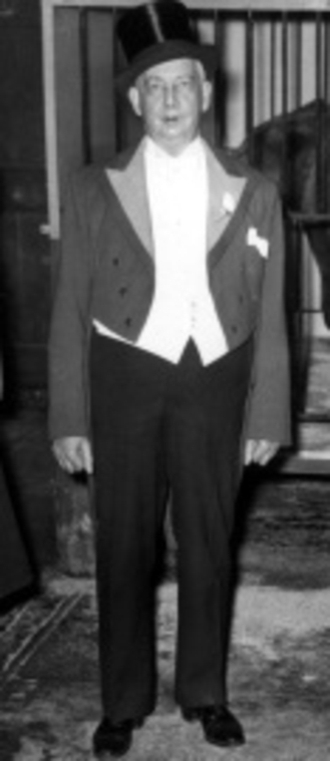
Dr ‘Dickie’ Hunter
who watched the act unaware of the earlier accident. Said Michele later: ‘It was nothing; it happens.’10
Low staff turnover is a a sure sign of good working conditions, and the Empire could certainly boast that. As Reynolds noted, ‘We were like one big family.’ Tommy Davy had been stage manager for fifty years when he retired in 1955. Herbie Stilling was the electrician for thirty-four years, Leslie Beresford, musical director for twenty-six years, and Margaret Cunningham ran the box office for twenty-one years, alongside Maureen McGovern for fourteen years. Then there was Nan Stirling, who hailed from Dundee. She was with the theatre for nearly forty years. Nan ran the grand circle bar and her judgement of a show was eagerly awaited—if she gave a show thumbs up, it was all right. So devoted was she that during her forty years, a week was as much as she could bear to stay away. And she was late on only one occasion and that was when, indulging her fondness for ‘the sport of kings’, she was delayed getting back from the Maze racecourse.
Herbert Stilling, theatre electrician and later stage manager, first came to the theatre in 1927. His recollection was that the record ‘house’ for the Empire was achieved during a two-week run by a stock drama company playing Maria Marten, or Murder in the Red Barn back in 1932. This spine-chilling thriller was challenged about two years later by a show with a completely different appeal— Jimmy O’Dea in Blarney.
Gertie and Kathleen McDowell were sisters who found happiness in working for the Empire. Gertie began as an usherette in 1922 and she and her sister, who
FINDLATERS
joined about the same time, were devoted to the theatre, getting to know everybody who attended it. Then there was May Hall, secretary to Frank Reynolds, who said she would work at the Empire for two years, and ended up staying for nine.
The Findlater company in Dublin employed James A. Kinnear & Co., a firm of professional accountants and secretaries to record the minutes of the board meetings. James A. Kinnear had joined Findlaters as a clerk before 1900, became company secretary and later set up on his own, while continuing to supply secretarial services to Findlaters. He was father to Nigel Kinnear, surgeon, who was instrumental in my attending Trinity. As the years passed different partners in Kinnears acted as secretary to the theatre. In 1919 Tom Bell took over from W. A. Davy, who left Kinnears. He held the post for fifteen years and was succeeded by Robert Cashell. He, in turn, was succeeded by Mervyn Bell. All these men were, in their time, senior partners in Kinnears, and were also board members of the Empire and contributed to its success. They provided similar secretarial services to Findlaters and many a young trainee can recall stock-taking in the Empire in Belfast, in the St Lawrence Hotel, Howth or in a troublesome Findlater branch. Kinnears were also auditors of high standing but the Findlater audits were undertaken, since incorporation at the end of the last century, by Stokes Brothers & Pim.
Gerry Morrison’s Come to the Show
The great wars of the 20th century each brought their quota of familiar songs for the Empire’s artists to sing. At the beginning of the century there were the songs of the South African War, then the World War of 1914-18, then of the Second World War, 1939–45. In this last war, battle was brought nearer to the people, when the first enemy bombs descended on Belfast in 1941, just as the last of the audiences was leaving the theatre. That night the entire cast was accommodated in the theatre.
Soon afterwards, an even heavier air raid on Belfast resulted in the theatre being closed for one night because of damage to the municipal electricity supply. That was the only occasion on which the theatre closed its doors during the war. When the doors were re-opened, at first the artists performed to tiny audiences. Slowly, however, perseverance on the part of the artists brought full houses again, and the theatre settled back into its important role of keeping the people happy and helping them forget, for the time being, the tension of the times.
One of the most dedicated employees of the Empire was Gerry Morrison who worked as manager between 1920 and 1945 (not to be confused with Robert Morrison who was a director). Gerry was employed at £10 per week plus a commission of 5 per cent on all profits over £500. It was primarily thanks to Gerry Morrison that entertainment was kept running at the Empire throughout the war. When a ban prevented artists from travelling to Northern Ireland, Morrison trained his own chorus of pretty local girls.
At the beginning of the war the governor of Northern Ireland, the Duke of
THE EMPIRE THEATRE OF VARIETIES, BELFAST
Abercorn, ordered all theatres in the province to close as part of a general UK wide ruling. With some chutzpah, Morrison rang No. 10 Downing Street, where the war cabinet was in session. He contacted a secretary there, and after some delay was advised, and it was later confirmed in writing, that the Belfast Empire could remain open. It was the only Belfast theatre to do so and even the famous Windmill Theatre in London, which boasted ‘we never close’, respected the closure.
The show running at that time was a London bill being put on by Mr Victor O’Mara with a revolving stage which was inadvertently recorded in the press as Victor Mara’s ‘Revolting Stage’. This stage was made to revolve by backstage staff pulling a large rope attached underneath it and the story goes that the rope was so long they had to pull the end out into Telfair Street—at the end of the performance Tommy Davy and the backstage staff arrived at the door of the kitchen bar still pulling hard on the rope!
Come to the Show ran for seven years between 1939 and 1947. The 100th performance took place on 8 July 1943 and was broadcast to the Irish forces overseas and the 250th on 28 November 1945, the proceeds of which were donated to two charities. The 1,500th performance was celebrated on 28 November 1946, a performance attended by the governor of Northern Ireland and numerous other dignatories.
Many of the Empire’s anniversaries were celebrated by live broadcasts from its stage. The first theatre broadcast from Ireland took place from the Empire in December 1927, when a portion of Richard Hayward’s revue Hip Hip Hoo-Radio was relayed through Belfast to Cork and Dublin. In 1936, the Empire celebrated its 50th broadcast, which was made in two parts. The first portion was broadcast on Tuesday 10 November from 7.30 pm to 8 pm and was relayed through the Empire transmitter at Daventry to the British Empire overseas, as well as through the Northern Ireland station. The second part of the broadcast took place on 12 November at 7.30 pm and was also relayed through the London regional transmitter. Two years later, in 1938, the Empire had the distinction of providing No. 6 in the BBC series of famous music halls, the commentator on that occasion being the then comparatively unknown Raymond Glendenning who was subsequently a distinguished BBC sports commentator.
Dermot chairman of the theatre
Dermot succeeded his father Willie as chairman of the Belfast Empire in 1941. In those days the board met monthly in the chairman’s office above Findlaters in O’Connell Street. The meeting at 2.30 pm was preceded by lunch in the directors’ dining room overlooking the Parnell monument. The manager travelled down on the Enterprise from Belfast, occasionally smuggling banned publications in a great brown envelope pompously labelled ‘Theatre Plans’.
Belfast being Belfast, questions of religion were bound to arise, but the Findlater policy was clear, as the only reference to religion in the board’s minutes states. In December 1934, in reply to a letter in the Ulster Protestant: ‘The serv-
FINDLATERS
ices of the late musical director were not dispensed with owing to his being a Protestant; as a matter of fact, the musical director who succeeded him was of the same denomination. The question of religion does not enter into the constitution of the staff in any way.’
The Catholic priest was as welcome inside the theatre as his Protestant counterpart. This was at first queried by some of the stage staff, but the chairman firmly insisted. The first night of a new show was always a Monday, and Dermot invited a representative of each Church and the trade unions, to see the show and to tell him if they found any aspects of it offensive.
On one occasion a well-known London revue bar had sent over its chorus of scantily clad young ladies. There were of course requests for a little bit more clothing, but the chairman handled these with diplomatic deftness and chose not to pass it down to the stage. On the other hand occasionally the public could provide a surprise, as in this letter from a lady: ‘As I have written several times to you advocating nude shows I feel I must write now to congratulate you on the super-excellence of the show you have there this week. I thought that no superlatives are good enough for it. However, do you think it is absolutely necessary that the nudes should wear loin-clothes or flesh-coloured tights, I don’t . . . or in the Ballet scene where you show the two almost complete nudes would it not be much more attractive if they were not wearing those very ugly skin coloured tights.’ Not everyone was so liberally-minded. John McGrail, a director of the Theatre, was less comfortable with some of the more smutty acts, as he explained to Tom Bell, a fellow director and secretary to the theatre:
The show was very good apart from Angus Watson, who was pretty blue, and after the show on Monday night I wanted Graham and McKay to take out one sketch of Watson’s which I thought was beyond the pale; but this could not be done apparently, and it was agreed to tone it down.
I had quite a long session with Graham and the producers about objectionable stuff going over, and made it very clear to them that we simply would not stand for the Theatre getting a bad name for smut. Frankly, I was rather disgusted with the comedy last Monday night.
Dermot was not averse to a practical joke on his Dublin friends, whom he liked to have as companions on his visits to the North. One night his friend, the insurance broker Blayney Hamilton, was accompanying him. Dermot invited Blayney behind the scenes. A colourful tram backstage, hidden from the performance by a large curtain, seemed a reasonable place to stop and chat. Dermot left his guest seated and talking to a stage assistant while he went to the artists’ bar, just off the stage, to replenish their glasses. A nod and a wink to the stage manager and the orchestra struck up immediately, the curtain rose and Jimmy O’Dea, as Biddie Mulligan, the Pride of the Coombe, delivered the re-charged glass to the startled Blayney, who was now centre stage and in full view of the audience. All he could do was sit fast in his tram seat, and hope that nothing further was required of him.
THE EMPIRE THEATRE OF VARIETIES, BELFAST
More seriously, Dermot had a unique position in Irish life, as managing director of a major food and drink distribution company in the South, and as chairman of the Empire Theatre. In Belfast he played host to all sorts of celebrities and public representatives, and from time to time was invited to Hillsborough, the governor’s residence. In Dublin he was the occasional guest of the president, Seán T. O’Kelly and his wife at Áras an Uachtaráin. But relations between North and South at this time were so frosty that there was no question of this connection being turned to advantage.*
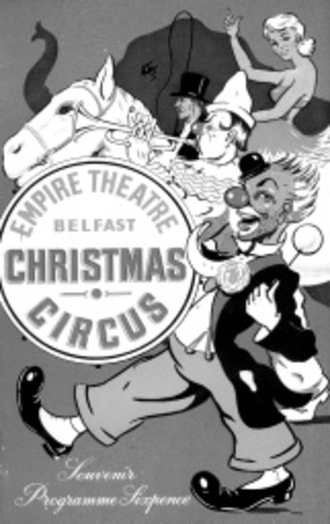
Charities
The Empire hosted many charity gala performances; colourful dress events under the patronage of the dignitary or celebrity of the day. The full box office takings were presented, often capped by the directors, and nothing was held back for production costs. The earliest charity performance that I can trace is a special matinée in connection with the linen stall in aid of the Ulster Hospital for Women and Children on Wednesday 9 December 1903.
Other notable occasions were the visit of the Princess Royal in June 1945 to receive a cheque for £1,000 [€38,000] for the YMCA War Fund. In November 1946 there was another gala night for charity ‘Melody, Magic, Mirth’ attended by the Governor and Countess Granville and the Prime Minister and Lady Brooke. The event earned a goodly sum for the Variety Artists Benevolent Fund and the Newspaper Press Fund.
In December 1953 six hundred youngsters, including two hundred orthopoedic patients from the Royal Belfast Hospital for Sick Children, the Ulster, City and Musgrave Park Hospitals were entertained by Dr Dickie Hunter’s famous circus of trained animals. The bill in 1954 included, as well as eight clowns, performing sea lions, dogs and horses and many ‘serious’ acts as well as a wire-walking act in which comedy was heavily underlined.
On 14 February 1955 the National Playing Field Association, Northern Ireland branch, benefited by £5,000 [€130,000] which was the entire proceeds of a gala performance celebration of the diamond jubilee of the theatre under the patronage of the Governor of Northern Ireland, Lord Wakehurst. Amongst the sport-
* The historic meeting between Seán Lemass and Terence O’Neill took place on 14 January 1965, four years after the Empire closed. Dermot died in 1962.
FINDLATERS
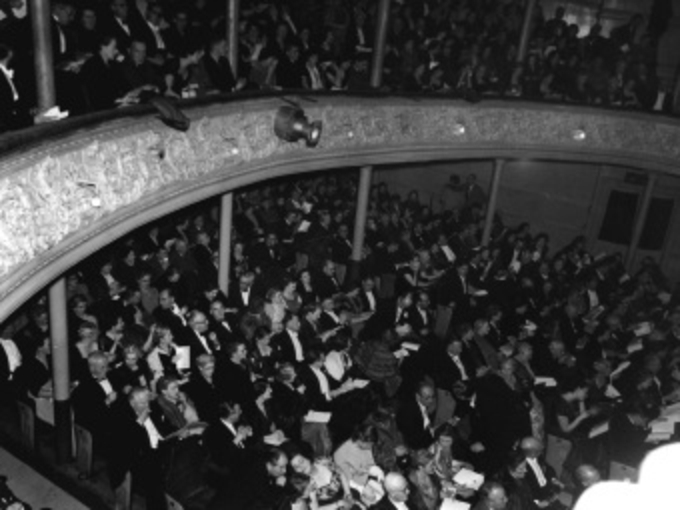
A full house for a gala performance at the Empire. October 1953
ing celebrities present and introduced to the audience were Thelma Hopkins (athletics), Dr Jack Kyle (rugby), Dr Kevin McGarry (soccer), Denis Coulson (hockey) and Fred Daly (golf ). And in October in the same year the theatre was honoured by the attendance of the Countess Mountbatten of Burma at a gala performance in aid of the Royal College of Nursing. No doubt Mother’s influence was at work: ‘the Theatre was magnificently decorated with many shades of chrysanthemums, dahlias and gladioli. The Royal box was particularly effective garlanded with flowers, and the beautiful dresses added dignity and charm to the already outstanding occasion.’11
Difficult times
Apart from these gala occasions, most weeks during the 1930s the audiences at the Empire were pitifully small, although the theatre never abandoned its twicenightly programme. Unemployment hit Belfast hard during this time, and this, juxtaposed with the rapid increase of wireless sets, heralded a bleak future for the Empire. Big names in variety like Lucan and McShane, Dave Morris and the Five Sherry Brothers did little to increase the takings. As Louis Gilbert noted, ‘more and more theatregoers stayed at home and by twisting a knob brought to their kitchens music, drama, and variety from London, Paris, Berlin, and even as far away as America.’
Another great menace was the growing popularity of ‘talkies’, and suddenly Holbin and Martin had to compete with Laurel and Hardy, Sheila Daly with Ginger Rogers. Many theatres, such as the Hippodrome, became cinemas, but the Empire carried on being a theatre despite dwindling audiences. Indeed, the
THE EMPIRE THEATRE OF VARIETIES, BELFAST
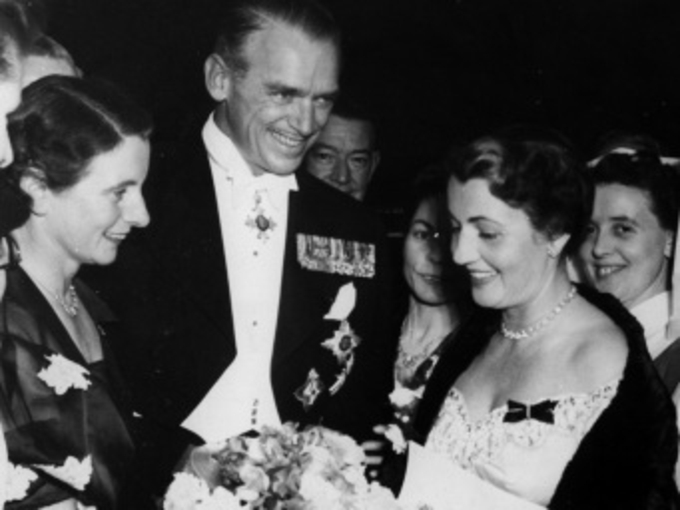
My mother (left), a Director of the Theatre, presenting a bouquet to Douglas Fairbanks Junior’s wife at a Gala charity performance. October 1953 (Studio Seven)
Empire only ever showed one short film billed as ‘The Bioscope’ which was shown every evening as the last item on the programme. Senator Connolly cynically remarked that the reason for this was probably that it ‘afforded an equal opportunity to those who wanted to get “one for the road” and to those who did not want to be present when “God save the King” was being rushed through by the orchestra.’12
The audiences stayed on for many years after the war, but then a challenge bigger than wireless or talking-picture came to compete with the Empire: the television set. Suddenly the Empire was facing financial ruin. Something radical had to be done to pull the audiences back in.
At the end of the 1950s there was a brief new opportunity for the Empire as a serious theatre, when Dermot, reading of a row about a new and controversial play called Over the Bridge, decided to offer the resources of the Empire to allow it to be staged. 1959 was a difficult year for Ulster theatre. There were palpable differences of opinion between the councils of CEMA*, the Group Theatre and the Arts Council, and it was felt by many that the future of Northern Ireland theatre was at risk.
Dermot saw the need for a municipal theatre that would serve as a national theatre for Northern Ireland, and the directors of the Empire agreed with this view realising that the era of variety and the old music hall was passing.
*Council for the Encouragement of Music and the Arts, the Northern Ireland equivalent of the British Arts Council.
FINDLATERS
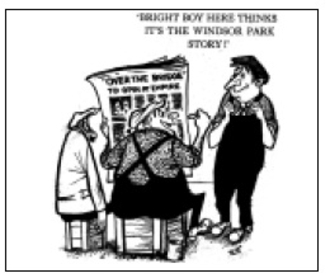
Ireland’s Saturday Night - 23 Jan 1960
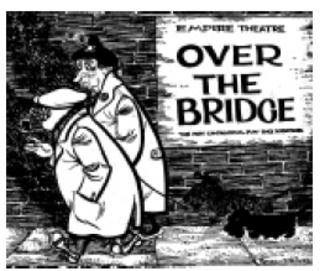
I tell you it has nothin’ whatsoever to do with traffic problems! Belfast Telegraph 23 Jan 1960
Accordingly, they entered into negotiations with various influential groups interested in the Northern theatre. But according to an unpublished article written by Dermot and John McGrail, his co-director, negotiations were not as productive as they would have wished them to be:
Although the Belfast Empire Theatre by virtue of its size, design and intimate atmosphere is eminently suitable for adoption as a National Theatre, the negotiations failed. The Directors then conceived the idea of a National Theatre Group associated with the Empire Theatre and as a result they arranged with Ulster Bridge Productions for the presentation in the Empire of Sam Thompson’s highly controversial play ‘Over the Bridge.’
This now famous play, although rejected elsewhere, was considered by the Empire Directors not only to be a play of great merit but also to be a play of considerable importance particularly to Belfast and Northern Ireland. Its main theme, the evolution of Trade Unionism in the shipyards, reflected one of the most important social developments of these times whilst the sectarian issues represented the variable factors that in other environments would be expressed in other forms. The language of the play was certainly strong, but it was the authentic language of the characters it sought to depict. At the same time it was a highly moral play, wholesome, honest, sincere and it had the great attribute of simplicity—simplicity in the classical sense of being uncomplicated. Considered against the background of most modern plays it was refreshing to find a play that had neither the need nor the time to indulge in the all too familiar sex motif. All in all the directors felt strongly that to deny the play a platform would be a tragedy whilst on the other hand its well staged presentation in a suitable theatre might well mark the beginning of a renaissance in the Ulster Theatre.13
Over the Bridge, written by a forty-two-year-old shipyard worker, Sam Thompson, was originally intended for the state-aided Group Theatre and had been scheduled to be staged. However, the play was thought to be too explosive and liable to stir up religious strife in the country and shipyard. The board of the Group Theatre wanted a mob scene removed, but Sam Thompson refused to take out one word, contending that it was unbiased: ‘It mixes sectarian feeling
THE EMPIRE THEATRE OF VARIETIES, BELFAST
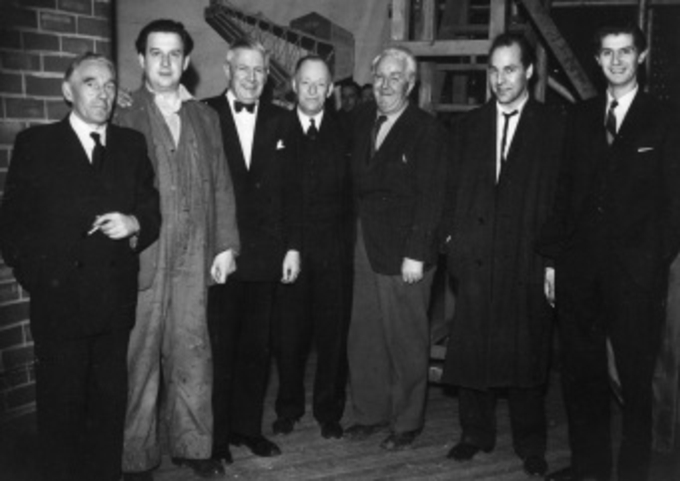
(Left to right) On the set: J. G. Devlin, Sam Thompson, Cecil Reynolds, Dermot, Joseph Tomelty, Harry Towb and Jimmy Ellis (Photo: Studio Seven)
with trade unionism after a time bomb blows up a transformer in the shipyard. Belfast is the one place where the play should go on. I am holding up a mirror. It took me two years to write in the attic of my home every Sunday.’
Jimmy Ellis must take the credit for seeing that this important play was staged. He was at the time the producer director at the Group Theatre. He felt very strongly that it should be staged, and without cuts. He resigned over this issue and formed a new company to make certain that Belfast would see it. ‘We are not afraid of this play. It is honest and should be judged from that standard.’14 The Evening Herald said of it ‘it is not so much a play as a typhoon, sweeping trivialities brusquely aside and exposing to view the hard core of intolerance and hatred that can exist in the name of religion.’15
When Dermot heard about this furore he read the play, phoned his co-director John McGrail and the Empire manager in Belfast, Frank Reynolds, and suggested they stage it. Reynolds and McGrail agreed with Dermot. As McGrail said in an interview with the Irish Independent: ‘Sam Thompson, a Belfast man and former shipyard worker, has important things to say about the lives of men spent building ships in the great Queen’s Island shipyard that lies just across the Lagan beyond Belfast’s Queen’s Bridge. While Thompson believes that what he has to say is of universal interest; he has the unshakeable conviction that it has to be said first in Belfast!’16
The play went ahead and received much coverage in the local newspapers. The headlines tell the story: BANNED PLAY GOES ON; CONTROVERSIAL PLAY WILL BE STAGED; PLAY IS PLEA FOR TOLERANCE; THE SS-S-SH SHIPYARD PLAY GETS AN AIRING.
FINDLATERS
On opening night, 26 January 1960, the tension was immense. The RUC were thick in Victoria Square and the streets around the Empire. There was an expectation that there could be trouble but none materialised. The theatre was packed to capacity and the audience responded to the powerful plot and outstanding performances. Dermot, his wife Dorothea, John McGrail, Frank Reynolds and Jimmy Ellis, all directors, must have shared a great sense of elation as the evening concluded successfully and without incident. And to top it all, the reviews were excellent. The following morning, playwright and Empire management met at the theatre early to discuss the possibility of Dublin and London runs, and to consider rearranging the Belfast schedule to accommodate an extended run. As Dermot commented at the time: ‘All wildly exciting and giving us renewed hope for the future of the Theatre.’
Indeed, the play was such a success that the Empire Theatre had to extend its run for a fifth week, a fact that the Belfast Newsletter picked up on, noting that 40,000 people were likely to see the play on its opening run, a record for the city. Indeed, previous to its extended run 14,000 had seen the play and queues for bookings were commonplace.
Newspaper reviews of the play were highly favourable. Michael Mills, of the Irish Press, described it as ‘a moving and exciting work’, and ‘one of the finest tragi-comedies that theatre has thrown up in many years. As O’Casey knew his Dublin, Thompson knows his Belfast and especially her shipyards; he knows the moods of her people; their weaknesses and their strengths; their love and their bigotry. Above all he is aware of the smouldering bitterness which lies behind religious bigotry. Mr Thompson adopts here the role of impartial observer, flaying the people responsible for victimisation, whether the victim is Catholic or Protestant. He takes no sides, but uses his play as an eloquent and most effective theme for toleration, not only of the Catholics by Protestants but of Protestants by Catholics.’17
Similarly, the Presbyterian Herald noted that the play was ‘strikingly fair to both sides’ and that it had ‘a quality of inhibitedness which gives it great force.’18 Both newspapers hinted that the play needed a more contemporary background, but neither felt that this detracted in any way from the drama. The Presbyterian Herald continued, ‘In its presentation of these social and industrial problems, in both characterisation and argumentation, the play is intelligent, penetrating and worthy of serious study.’ The Irish Press agreed: ‘This is theatre in its most entertaining and exciting form.’
According to the Irish Press the characters were all ‘real and teeming with life’ and ‘excellently portrayed’. ‘Outstanding is J. G. Devlin as the union branch secretary, a glib witty character whose Bible is his union rulebook. Harry Towb also gave a strong performance as the younger union member, selfish and generous by turns. Joseph Tomelty, after a shaky start, found his feet in the second part. Charles Witherspoon, Sam Thompson himself, James Ellis, John McBride and Ray Alcorn all gave a delightful performance. In fact there was no weakness in the very large cast.’19
THE EMPIRE THEATRE OF VARIETIES, BELFAST
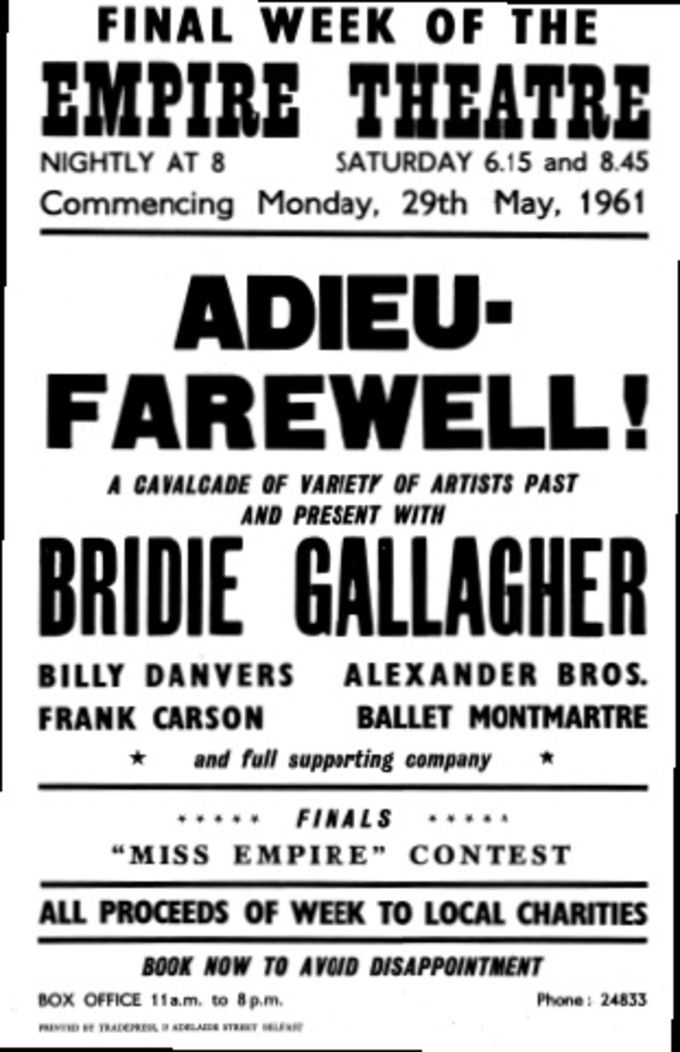
The bill that signalled the ending of the family’s 80-year involvement in the theatre business.
FINDLATERS
Following the success of Over the Bridge a new policy was inaugurated at the Empire to bring much more ‘straight’ theatre to Belfast. Cyril Cusack’s company of players presented Shaw’s Arms and the Man. Samuel Beckett’s Krapp’s Last Tape acted as a curtain raiser to inaugurate this change of policy.
The sun sets on the Empire
However, despite these and other excellent productions, such as Milo O’Shea, Rosaleen Linehan, Frank Kelly and others in Glory Be!, a ballet season with the Western Theatre Ballet, Siobhan McKenna in The Playboy of the Western World and Danny Cummins in his review Funzapoppin, costs continued to exceed revenues and an attractive offer from Littlewoods, whose department store fronted the block, ended the family’s sixty-seven-year theatrical involvement with the city. Just a month earlier the Opera House (opened in 1895) and the Royal Hippodrome (1907) had been acquired by the Rank Organisation.
In true Findlater style, the final week in 1961 was memorable and nostalgic and in the words of Frank Reynolds, the manager, the theatre ‘went out with all flags flying’. The seats were booked out weeks in advance. The Governor of Northern Ireland, Lord Wakehurst, a regular at the Empire, and his party, paid his farewells to the cast and the staff on the Friday night. Donegal’s own Bridie Gallagher, the great Irish ballad singer of the era, sang down the final curtain. The entire proceeds of the week went to charity, except for the last night which went to the staff.
The closing of the Empire was heartbreaking for those who had been part of this theatrical family for so long. As Louis Gilbert lamented: ‘It was hard to visualise what Victoria Square will look like without the Empire. When the little theatre is demolished serious faced businessmen and efficient shop girls will take the place of comedians and glamorettes. In the modern 20th century store that is to replace it, we will be able to buy many things–but not the happiness the Empire sold to so many.’20
But perhaps the last words should go to Jimmy Devlin who, only eighteen months earlier had performed in Over the Bridge: ‘The Irish have been noted for going to a wake; there used to be a lot of fun about a wake but this is tragic, the last of the Empire.’
Notes and references
- Belfast Evening Telegraph 26 October 1895
- Farrall v Reynolds and others (High Court), Findlater archive
- Board Minutes 6 December 1916
- Idem. 3 March 1931
- Idem. 16 July 1930
- Idem. 25 September 1912
- Evening Herald 13 November 1897
- J. Anthony Gaughan (Ed.) Memoirs of Senator Joseph Connelly Dublin: Irish Academic Press 1996 pp 55-9
- Belfast Telegraph 20 January 1961
- Sunday Independent 13 February 1955
THE EMPIRE THEATRE OF VARIETIES, BELFAST
- Irish Press 21 January 1958
- Belfast Newsletter 5 October 1955
- Gaughan op. cit. p 56
- D. Findlater and J. McGrail ‘The theatre in Ulster–the Empire Theatre of Varieties’ unpublished. Findlater archive
- Daily Express 19 January 1960
- Evening Herald 15 March 1960
- Irish Independent 19 January 1960
- Irish Press 27 January 1960
- Presbyterian Herald August 1960
- Irish Press 27 January 1960
- Belfast Telegraph 20 January 1961
